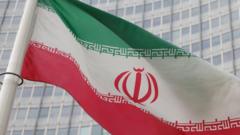The latest IAEA findings suggest a shift in Iran’s nuclear posture, heralding potential international ramifications and a renewed diplomatic crisis.
Iran's Nuclear Compliance in Question: IAEA Report Raises Alarms

Iran's Nuclear Compliance in Question: IAEA Report Raises Alarms
The International Atomic Energy Agency highlights Iran's failure to adhere to nuclear obligations, prompting global concerns.
In a worrying development, the International Atomic Energy Agency (IAEA) has reported that Iran has failed to meet its nuclear non-proliferation obligations, marking the first such finding in two decades. This troubling news emanates from a resolution endorsed by the IAEA’s board of governors, which indicates the possibility of an upcoming referral to the UN Security Council should Iran continue its non-compliance.
The IAEA's report from last week highlighted Iran's lack of cooperation, raising serious questions about undisclosed nuclear activities and materials in regions previously scrutinized by international monitors. In response, Iranian Foreign Minister made a pointed statement to European nations, cautioning that supporting the recent motion could have severe consequences, and promising a “strong” reaction from Iran.
These developments complicate ongoing negotiations for a renewed nuclear agreement between Iran and the United States. Simultaneously, U.S. officials have warned American citizens to leave the region, amid heightened tensions and reports of Israeli military preparations to target Iranian nuclear sites.
Iran has consistently maintained that its nuclear program is solely for peaceful purposes and the nation rejects any intentions of pursuing nuclear weapons. The backdrop to this tension lies in the 2015 nuclear deal established with six global powers, which saw Iran agreeing to limit its nuclear program in exchange for sanctions relief. However, the withdrawal of the U.S. from the agreement in 2018 under President Trump triggered a cycle of escalated sanctions and Iranian breaches of the accord, particularly concerning uranium enrichment practices.
The latest IAEA findings reveal Iran has amassed over 408 kilograms (approximately 900 pounds) of uranium enriched to 60% purity, a level close to weapons-grade material and sufficient to potentially produce nine nuclear bombs, further intensifying worries within the international community regarding Iran's nuclear ambitions.





















